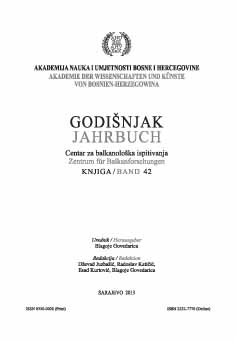Bosna i Hercegovina u austrougarskoj politici gradnje željeznica prema Istoku
Bosnia and Herzegovina in Austro-Hungarian policy of railways building towards the East
Author(s): Dževad JuzbašićSubject(s): History
Published by: Akademija Nauka i Umjetnosti Bosne i Hercegovine
Summary/Abstract: While the Central European issues dominated in Austrian politics, the Habsburg Monarchy was not able to get more politically engaged in the Balkans. The turning point in relation towards the Austrian construction of the Balkan railways came into being only after the historical events that have significantly changed the position of the monarchy in Europe. This turning point in the policy, which is to some extent prepared by Beust, was marked with his departure from Ballhausplatz and appointment of Julius Andrássy as foreign minister in 1871. At the Beust’s time construction of the direct rail connection with the Ottoman Empire was seen as a political and economic necessity for the Monarchy and the Turkish plan to build rail connection from Constantinople to the Austrian border near Novi in Bosnia, created in 1865, have fit the intentions of its policies. However, implementation of this plan in Bosnia ended the 1872 with construction of the normal line from Doboj to Banja Luka. Austrian and Hungarian different interests in terms of the direction of the route to the Orient and foreign policy problems were an obstacle to the connection towards the East. Andrássy’s railway policy vacillated in terms of preference over the line through Serbia or Bosnia. Hungary was firmly against the eventual construction of the Bosnian lines before establishing a connection with the Orient through Serbia. Hungarians have agreed on a connection Sisak – Dobrljin only after ensuring the main train connections via Belgrade and interests of the Hungarian railways in the Bosnian traffic with Rijeka. Hungarian government has succeeded taking the win in its conception of the realization of rail connection with the Orient and Bosnia. Hungarian interests have played a significant role in the steps undertaken by the Andrassy, while in the Austrian public, after the Berlin Congress, was present dilemma for the most rational route for the rail connection with the East. This problem will be actualized on several occasions in the late 19th and early 20th century, when new importance in the policy of the Monarchy in the relations between Austria and Hungary was gained. The Hungarian government tended more to secure themselves in relation to Austria, with more appropriate position in Bosnia for the establishing a connection with the East, than they originally had in mind as benefits of rail connection with Bosnia.
Journal: Godišnjak Centra za balkanološka ispitivanja
- Issue Year: 2013
- Issue No: 42
- Page Range: 165-196
- Page Count: 32
- Language: Bosnian

